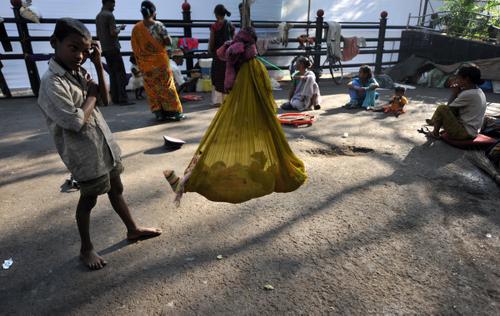Delhi infant mortality up nearly 20%
A street childsleeps in a makeshift hammock by a roadside in Mumbai on January 23, 2011. Some 42 percent of Indians, or 455 million people, live on less than 1.25 dollars a day, according to the World Bank and India’s statistics on health, infant mortality and malnutrition are worse than those for sub-Saharan Africa.
The infant mortality rate in India's capital city and its environs rose 18.5% between 2009 and 2010 due to a collapse of the public health system, experts say.
The number of children dying in their first year of birth in the state of Delhi rose from 18.96 per thousand to 22.47 per thousand, the Times of India reported.
"This is shocking. Delhi should be the role model but it is clearly lagging behind states like Goa and Kerala, where the infant mortality rate is less than 12 per thousand," the paper quoted Mira Shiva, founder, People's Health Movement and coordinator of Initiative for Health and Equity in Society, as saying.
Shiva added that the government is encouraging women to give birth at hospitals, but infrastructure required for its welfare schemes remains poor. "In most maternity centers, infection rates are high due to lack of hygiene. The number of doctors and nurses is low," the paper quoted Shiva as saying.
Child rights activist Raaj Mangal Prasad said the increased rate of infant mortality is reflective of the collapse of the public health system. "Public sector hospitals are overburdened. Private sector has grown significantly but that is inaccessible to a large population. Many people in slums still go to quacks for treatment," he added.
In recent years, Delhi's large private hospitals have come under fire for failing to fill beds reserved for providing free treatment to destitute patients — a condition the government demanded in exchange for selling them state-owned land at low prices. Meanwhile, as GlobalPost wrote in "The Dark Side of Medical Tourism," the proliferation of high-quality — but high-cost — medical facilities has allowed the government to get away with spending precious little on health care without facing flak from powerful constituents.
The Indian government spends only 0.9 percent of its gross domestic product on health care, ranking 171st out of 175 countries in public health spending, according to the World Health Organization. It relies on the private sector, which contributes another 4.3 percent of GDP, to make up the shortfall.
The story you just read is accessible and free to all because thousands of listeners and readers contribute to our nonprofit newsroom. We go deep to bring you the human-centered international reporting that you know you can trust. To do this work and to do it well, we rely on the support of our listeners. If you appreciated our coverage this year, if there was a story that made you pause or a song that moved you, would you consider making a gift to sustain our work through 2024 and beyond?
